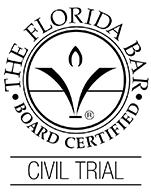Traumatic brain injuries (TBIs) are some of the most severe and life-altering injuries a person can endure. Whether caused by a car accident, fall, or workplace incident, TBIs can result in long-term cognitive, physical, and emotional challenges. These injuries often require extensive medical treatment and rehabilitation, and they can lead to significant financial burdens for victims and their families. Understanding the legal aspects of a TBI case is crucial to ensuring that you receive the compensation you deserve for your recovery.
At Dismuke Law, we have decades of experience handling complex personal injury cases, including those involving traumatic brain injuries. Led by Board-Certified Civil Trial Lawyer David C. Dismuke, our team understands the intricacies of Florida’s legal system and how to build strong cases for maximum compensation. We treat each case with personalized attention, ensuring every detail is meticulously examined.
How an Attorney Can Help You After a Traumatic Brain Injury
A traumatic brain injury (TBI) can drastically change your life, leaving you with physical, emotional, and financial burdens. Navigating the legal process for compensation can be daunting, especially when dealing with complex medical issues and uncooperative insurance companies. That’s why having an attorney by your side is essential to ensure your rights are protected and that you receive the compensation you deserve.
A few ways our team can help can help you include the following:
- Gathering Evidence: Your attorney will collect critical documentation such as medical records, diagnostic reports, and expert testimonies to build a strong case.
- Negotiating With Insurance Companies: Attorneys handle communications with insurers and fight to secure a fair settlement that includes current and future expenses related to your injury.
- Calculating Future Damages: They work with experts to determine the long-term financial impact of your injury, including ongoing medical care and lost earning capacity.
- Preparing for Trial: If a settlement can’t be reached, your attorney will be fully prepared to take your case to court, advocating for your rights in front of a judge or jury.
- Providing Peace of Mind: By managing all legal aspects of your claim, an attorney allows you to focus on your recovery and avoid the stress of dealing with legal complexities.
Having a knowledgeable attorney ensures that you won’t have to navigate these challenges alone. At Dismuke Law, we bring years of experience and dedication to fighting for the compensation you need to recover from a traumatic brain injury.
Proving Liability After a Traumatic Brain Injury
Proving liability in a traumatic brain injury (TBI) case is a critical step in obtaining compensation for your medical expenses, lost wages, and long-term care. In order to hold someone accountable for your injury, you must demonstrate that their negligence or wrongful actions directly caused the accident. Establishing liability can be complex, but with the right legal strategy and evidence, it is possible to build a compelling case.
The following are the key elements involved in proving liability for a TBI:
- Establishing Duty of Care: The responsible party must have owed you a duty of care, meaning they had a legal obligation to act in a reasonably safe manner, such as driving safely or maintaining a hazard-free property.
- Proving Breach of Duty: You must show that the defendant breached their duty by acting negligently or recklessly, like running a red light or failing to repair dangerous conditions.
- Causation: It must be demonstrated that the breach of duty directly caused your traumatic brain injury, linking their negligence to your accident and resulting harm.
- Damages: Finally, you must provide evidence of the damages you suffered as a result of the injury, including medical bills, lost wages, pain and suffering, and any ongoing care needs.
An attorney will gather evidence to support these elements, including accident reports, witness statements, medical documentation, and expert testimony. They will also investigate all potential sources of liability, such as a negligent driver, a property owner, or even a manufacturer of faulty equipment, depending on the circumstances of the accident.
Types of Traumatic Brain Injuries and Their Symptoms
Traumatic brain injuries (TBIs) are classified based on their severity: mild, moderate, and severe. Each type can have different symptoms and long-term effects, and the appropriate medical response will depend on the severity of the injury. Understanding these classifications can help identify the best treatment options and determine the injury’s long-term impact.
Mild TBI (Concussion)
Mild TBIs, commonly known as concussions, are typically caused by a blow to the head or a sudden jolt that shakes the brain. Symptoms can include headaches, dizziness, confusion, blurred vision, and temporary memory loss. Although these symptoms may resolve on their own, some individuals experience lingering effects, such as sensitivity to light, difficulty concentrating, and mood changes. While a mild TBI is not life-threatening, it still requires medical evaluation, as repeated concussions can lead to more serious health issues.
Moderate TBI
Moderate TBIs are characterized by a longer loss of consciousness (up to 24 hours), or a significant period of confusion and disorientation. Symptoms are more pronounced and can include prolonged headaches, nausea or vomiting, difficulty with speech, coordination problems, and cognitive impairments. Individuals with moderate TBIs often need more intensive medical treatment, which may include imaging scans, physical therapy, and cognitive rehabilitation to assist in their recovery.
Severe TBI
Severe TBIs typically result from significant trauma to the head, such as from a car accident or fall, and can lead to a loss of consciousness for more than 24 hours or even a coma. These injuries often cause permanent damage, affecting memory, motor skills, speech, and emotional regulation. Symptoms may include seizures, profound confusion, slurred speech, loss of coordination, and extreme behavioral changes. Severe TBIs often require emergency surgery, long-term rehabilitation, and, in some cases, lifelong care.
The symptoms and recovery process can vary significantly between mild, moderate, and severe TBIs, but early medical intervention is critical for improving outcomes and reducing the long-term effects of brain injury.
Why Choose Dismuke Law for Your Traumatic Brain Injury Case
At Dismuke Law, we understand the complexities of traumatic brain injury (TBI) cases and the profound impact these injuries can have on every aspect of your life. With years of experience handling personal injury cases, our team is committed to helping you navigate the legal process and secure the compensation you need to cover medical expenses, lost wages, and long-term care. Our firm’s board-certified civil trial lawyer, David C. Dismuke, leads our efforts with a personalized approach to every case, ensuring that we build a strategy tailored to your unique circumstances.
Our team is prepared to negotiate aggressively with insurance companies or take your case to trial if necessary. When you work with Dismuke Law, you can trust that we will fight for the compensation you deserve. Contact us today at (863) 250-5050 or through our contact form for a free consultation.


![cftla-member[2]](https://www.1800askdave.com/wp-content/uploads/2022/03/cftla-member2.png)
![cftla-member[3]](https://www.1800askdave.com/wp-content/uploads/2022/03/cftla-member3.png)










